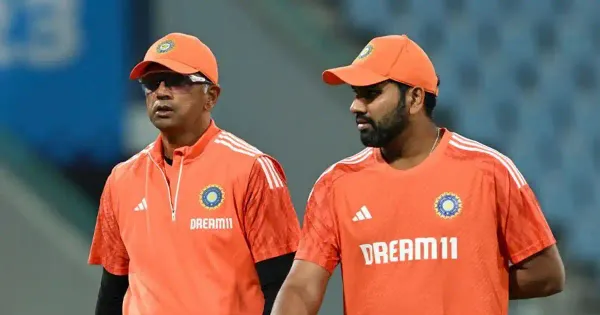Speakin g exclusively to Star Sports, Former Indian cricket team coach, Rahul Dravid, talked about his feelings when he held the T20 World Cup trophy and his celebrations afterwards. He said, “I think it just comes out. You don’t plan these things, you don’t think about these things. Of course, most times, I try to keep my emotions in check as a coach where you’re expected to do that. But at that moment, I think it just came out. To be honest, I felt really happy for the team. I felt happy for all of those boys. I felt happy for the support staff—so many people who had worked really hard with me, along with me. And not only in that tournament, I’d been with the team for almost two and a half, three years.”
“We had come close a few times, whether it was the semifinals of the last T20 World Cup in Australia or the World Championship final in the 50-over World Cup in India. And we were just not able to cross the line in those critical moments. We were playing better, and we were playing good cricket. But sometimes, even in those situations, you can play well, but you need a little bit of luck, you need a little bit of destiny to work, to go your way. And I think that day it was with us. In some of the other tournaments, unfortunately, it was not with us. And I think a lot of that was just happiness and relief coming out.”
Talking about the challenges he faced during his transition from his early days of coaching the Under-19 Indian cricket team to the senior-level team full of superstars, he said, “Well, I think I can’t completely take all the credit for that. I believe the teams are really led by the group of senior players, led by the captain. So, I think it was a privilege to work with Rohit. In these two and a half years, I think he was a fantastic leader. People really gravitated towards him, the team. I think that makes a big difference. There were a lot of other senior players as well, whether it was Virat, Bumrah, or Ashwin in Test cricket that we played. So many of them—just because a lot of Indian cricketers are big names, and they are superstars, and rightly so, and they’re followed by so many people—sometimes people think that they have big egos and that they are very difficult to manage.”
“But actually, I think it’s just the opposite. A lot of these superstars are actually very humble about their preparation. They are humble about their work ethic. And that is why they are superstars. Look at Ashwin today; at this age, he’s willing to adapt, he’s willing to learn. So just one example. Of course, at times you have to manage them, manage their bodies, manage the workload, a lot of those things. But to be honest, it was not very difficult. I had a good group of people around me. And it was a privilege and a pleasure to work with some of these guys. And I’m happy we were able to create a good environment. But a lot of the credit must go to the captain and the senior people who, to be honest, actually drive a team.”
Talking about the lowest point of his coaching journey with the Indian cricket team, he said, “For me, the lowest point was the South Africa Test series early on in my career. We won the first Test match in South Africa in Centurion. And then we were playing the second and third Test match.”
“We’ve never won a series in South Africa; it was a really big opportunity for us to win that series. Some of our senior players were not there. Rohit Sharma was injured, and we didn’t have some senior players in that series. But we were very close. In both the second and third Test match, in the third innings, we had a big opportunity. We could have set a decent score and won the game. But South Africa played well. They chased back in the fourth innings. So I would say that that was probably my lowest point in my coaching journey—not being able to win that series in spite of being ahead.
(With inputs from press release)
